Key takeaways:
- Understanding SEO requires staying informed and adapting strategies proactively in response to algorithm changes.
- SEO builds trust with users, enhances organic traffic, and establishes a sustainable online presence, differentiating it from pay-per-click strategies.
- Key factors influencing SEO include content quality, user experience, and backlinks, all of which are essential for maintaining search rankings.
- Continuous learning and collaboration within the industry can lead to innovative strategies and a deeper understanding of SEO dynamics.
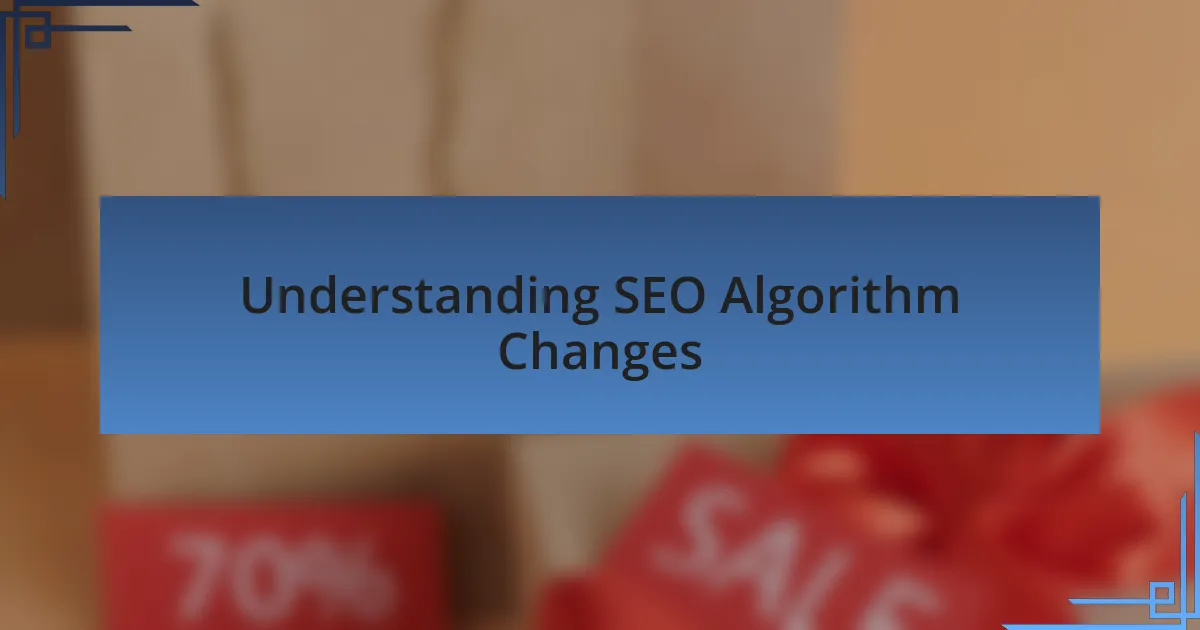
Understanding SEO Algorithm Changes
SEO algorithm changes can feel like navigating a maze without a map. I remember when Google rolled out a major update, and our traffic took a dive overnight. That day, I was left questioning everything—what had I missed? This constant evolution is a reminder that what worked yesterday may not work tomorrow, keeping us on our toes and perpetually learning.
Every update can appear daunting, but I’ve discovered that staying informed truly makes a difference. I often find myself revisiting the basics—understanding user intent and content relevance. It’s fascinating how these principles remain constant, even while the rules of engagement shift. I sometimes wonder: how can we leverage this unpredictability to improve our strategies rather than fear them?
In my experience, adapting to these changes has become less about reacting and more about proactive engagement. For instance, I often analyze our site’s performance metrics after any update to pinpoint areas for improvement. It’s intriguing to think of SEO as a living entity—one that grows and evolves, much like our own understanding of digital marketing. How often do we reflect on the data to pivot our strategies? It’s these moments that make the journey worthwhile.

Importance of SEO in Marketing
SEO is a cornerstone of digital marketing that often gets overshadowed by flashy advertisements and immediate results. I can recall a specific project where we focused heavily on SEO strategies. Over time, our organic traffic surged while competitors, relying solely on pay-per-click campaigns, struggled to maintain visibility. It really hit home for me—investing in SEO isn’t just about ranking on search engines; it’s about establishing a sustainable online presence.
In my experience, the importance of SEO extends beyond just attracting visitors. I’ve found that quality SEO builds trust with potential clients. When our content ranks high and provides real value, users perceive us as authorities in our field. Have you ever Googled something and automatically clicked on the first link? That trust translates into conversions, turning casual browser interaction into meaningful client relationships.
Moreover, SEO facilitates a deeper understanding of your audience’s behavior and preferences. Tracking search terms and user engagement metrics often leads to invaluable insights. I remember when refining our keywords helped us uncover a newly popular trend in our niche. Shouldn’t we use these observations to not only meet but exceed client expectations? This level of insight reinforces why mastering SEO is essential in any modern marketing strategy.

Key Factors Influencing SEO Algorithms
Search engines use a variety of factors to determine rankings, and they constantly evolve. One key factor that always stands out is the quality of content. I remember a time when we revamped our blog’s content strategy. By focusing on well-researched, engaging articles, we noticed not only improved rankings but also increased user engagement. It made me realize that providing value is always recognized—whether by algorithms or the readers themselves.
User experience is another crucial element influencing SEO rankings. When we optimized our website for faster load times and mobile compatibility, the changes were noticeable. Have you ever visited a site that took forever to load? Frustrating, right? Improved user experience leads to lower bounce rates, which, in turn, signals to search engines that our site offers something worth sticking around for.
Lastly, backlinks play a significant role in how search engines assess credibility. Building quality backlinks was a game-changer for us; I still remember the thrill of seeing an established site link to one of our articles. It felt good to know that respected sources recognized our expertise. This not only boosted our authority but also drove targeted traffic to our site. How valuable is that sense of community in the digital space? It transforms competition into collaboration and keeps the SEO momentum going strong.
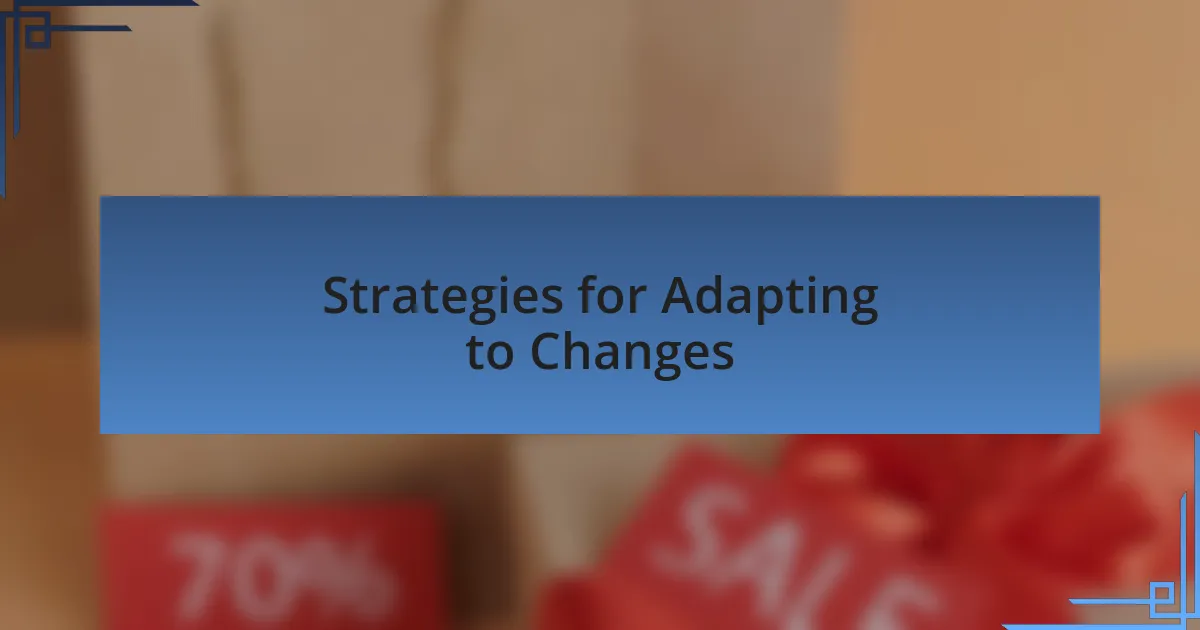
Strategies for Adapting to Changes
Staying proactive is essential when it comes to adapting to SEO algorithm changes. I remember a particularly nerve-wracking update last year that left many in our industry scrambling. Instead of panicking, I gathered my team, and we conducted a thorough audit of our existing content. What struck me was how quickly we spotted outdated practices we could improve. It was a powerful reminder that ongoing evaluation keeps us one step ahead.
Another effective strategy is to cultivate a flexible mindset towards SEO. When I first entered the industry, I had a tendency to cling to previous successes, but I quickly learned that adaptability is key. For instance, when Google introduced an emphasis on local search, we adjusted our approach and started optimizing our clients’ content for local keywords. Have you felt that rush of excitement when embracing a new challenge? Shifting your mindset can open doors to innovative strategies that resonate with the latest algorithm preferences.
Finally, continuous learning is vital. I often find myself attending webinars and reading up on the latest research findings in digital marketing. An eye-opening moment recently was when I discovered the importance of schema markup. It’s something I had overlooked previously, but implementing it on our site led to improved visibility in rich snippets. How is it possible that such a small detail can yield big results? Embracing a culture of learning ensures that my team and I are always equipped with the latest knowledge to navigate the evolving landscape of SEO.
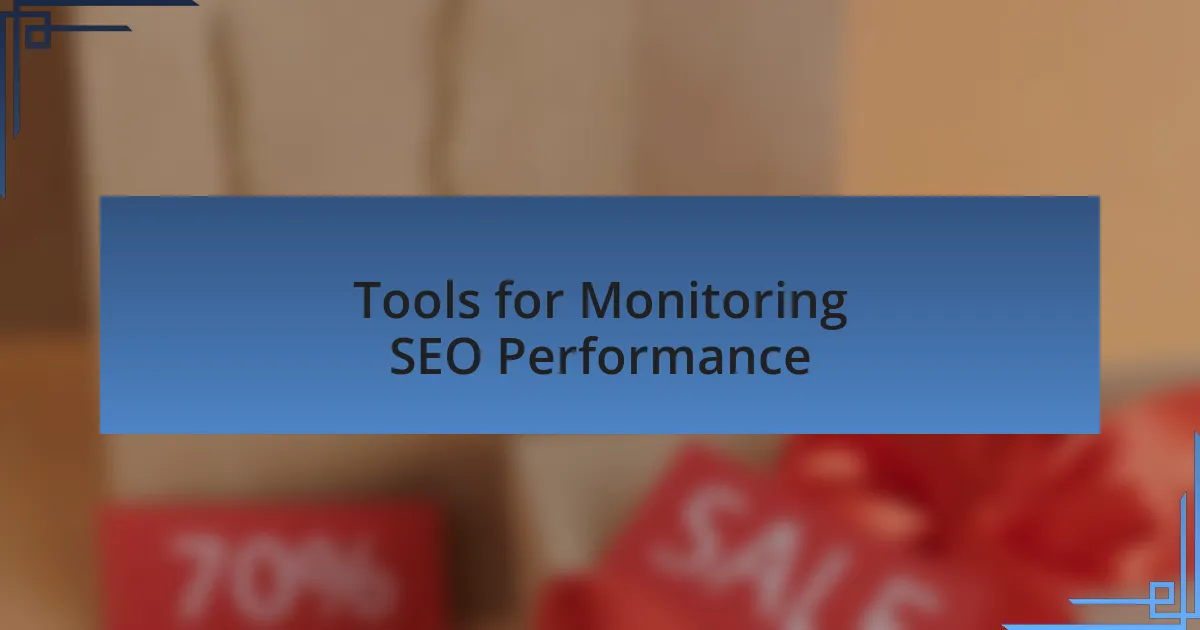
Tools for Monitoring SEO Performance
To effectively monitor SEO performance, leveraging the right tools is crucial. Tools like Google Analytics provide me with invaluable insights into traffic patterns and user behavior on our clients’ websites. Just the other day, I noticed a sudden drop in organic traffic for a client’s site. I quickly turned to this tool to analyze the data and identify the source of the issue, proving just how essential monitoring tools can be in addressing potential problems swiftly.
Another go-to resource for me is SEMrush. It combines multiple features into one platform, allowing me to track keyword rankings and perform competitive analysis seamlessly. I recall a time when I was able to pivot a strategy simply by observing a competitor’s keyword performance. It was like flipping a switch; suddenly, we were able to position our content more effectively. Isn’t it fascinating how a single tool can unveil so many layers of insight?
For tracking backlinks, I often use Ahrefs. The way it visualizes link growth over time has helped me articulate the importance of link-building strategies to my team. Once, after a successful campaign, I reviewed the link profile to celebrate the gains we achieved. That moment reinforced my belief that understanding our backlink performance not only enhances our SEO strategy but also boosts team morale when we see tangible results.
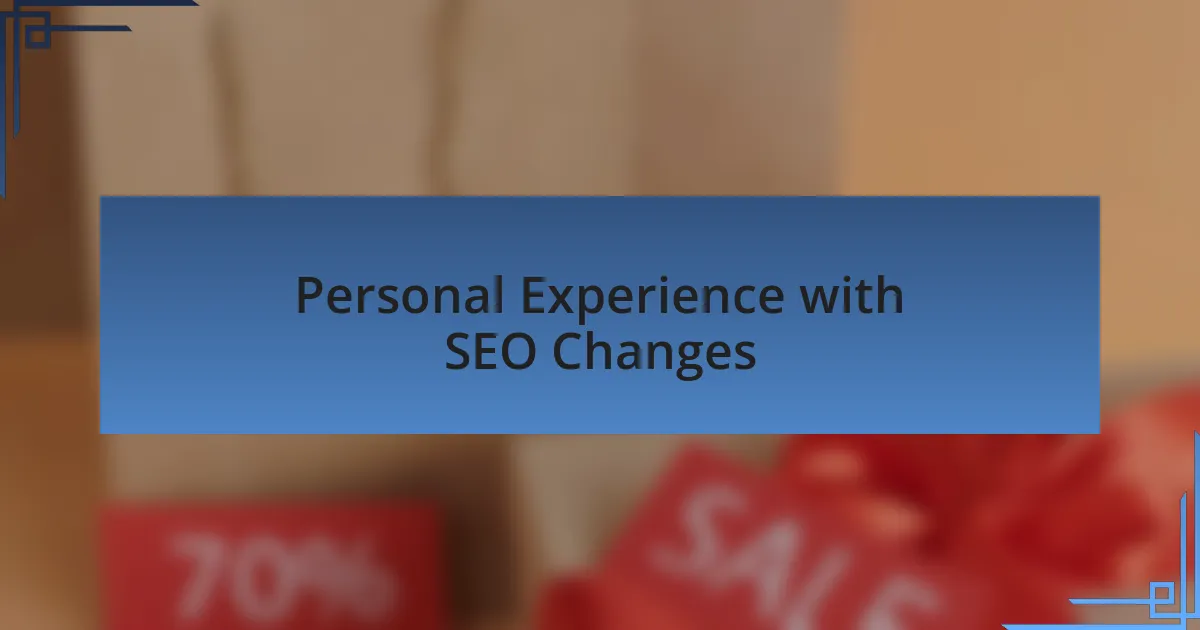
Personal Experience with SEO Changes
Staying ahead of SEO changes has been a journey for me, often filled with a mix of excitement and frustration. I vividly remember the day Google rolled out a major algorithm update that caught many of my clients off guard. I had to act quickly, analyzing search results and tweaking content strategies in real-time, which felt like a race against the clock. It’s moments like these that remind me how vital adaptability is in our field.
As I navigated through these changes, I felt a strong connection to the industry’s dynamic nature. I often reflect on a project where we faced a sudden dip in rankings after a pivotal update. Instead of panicking, my team and I gathered for a brainstorming session, and together we redefined our approach. It was a reminder that collaboration can turn challenges into opportunities. Have you ever experienced a collective brainstorming session that sparked fresh ideas? I find those moments can be truly transformative.
The emotional rollercoaster of SEO shifts has taught me that resilience is key. I once spent an entire week refining a client’s site only to see their traffic plummet after an unexpected algorithm change. It was disheartening, but I took it as a learning lesson. By analyzing our approach and observing how competitors adjusted, we eventually carved out a new path that led to recovery. Isn’t it fascinating how each setback can unveil newfound opportunities for growth?
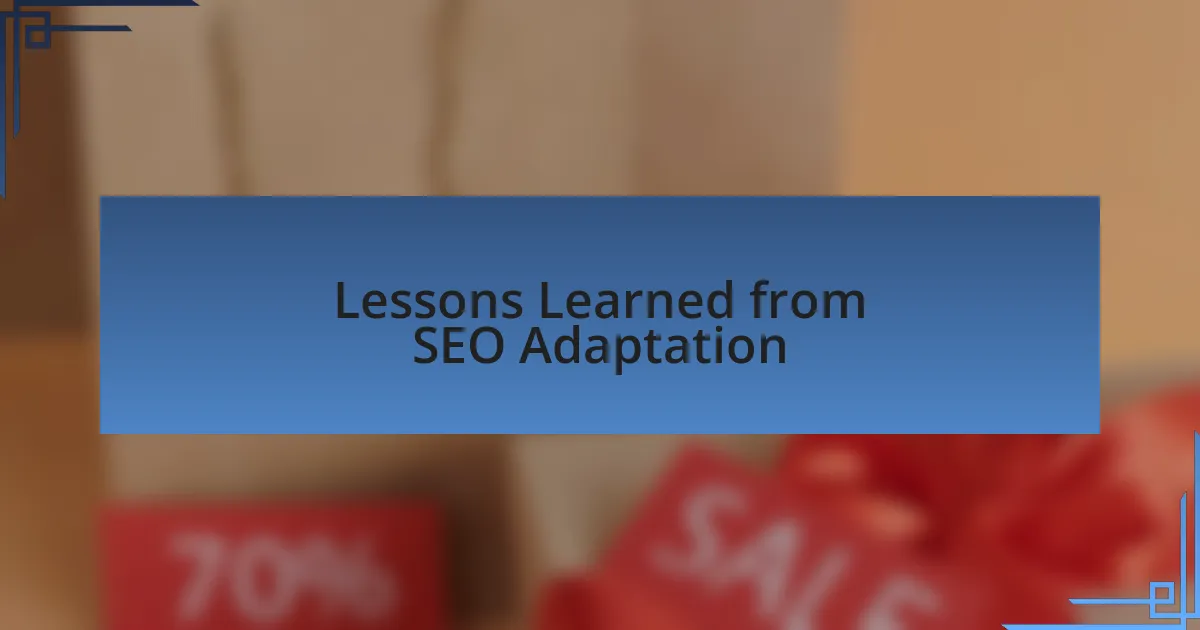
Lessons Learned from SEO Adaptation
Adapting to SEO changes has offered invaluable lessons over the years. There was a time when a sudden update left my site ranking lower than expected. Instead of viewing it as a defeat, I saw potential for reflection. I took a step back, examined what we had been doing, and realized that sometimes, less is more. Simplifying our strategies not only improved our ranking but also made our content more engaging for users. Have you ever had to strip away the complex layers to reveal something truly powerful?
Moreover, I learned the importance of staying informed about industry trends. During a significant algorithm shift, I found myself immersed in forums and webinars, gathering insights from experts. It was during these discussions that I discovered the value of a proactive mindset. By anticipating changes rather than reacting to them, I was able to incorporate new best practices ahead of time. Don’t you think being proactive could reshape the way we approach our strategies?
Lastly, my experiences have taught me that SEO is not just about technical tweaks; it’s about the relationships we build. Collaborating with other digital marketers, exchanging insights, and sharing strategies has opened doors I never anticipated. I recall a particularly fruitful partnership with a content creator that transformed our approach to link-building. Their unique perspective taught me that every connection can enrich our understanding of the ever-evolving SEO landscape. How often do you tap into your network for fresh perspectives?